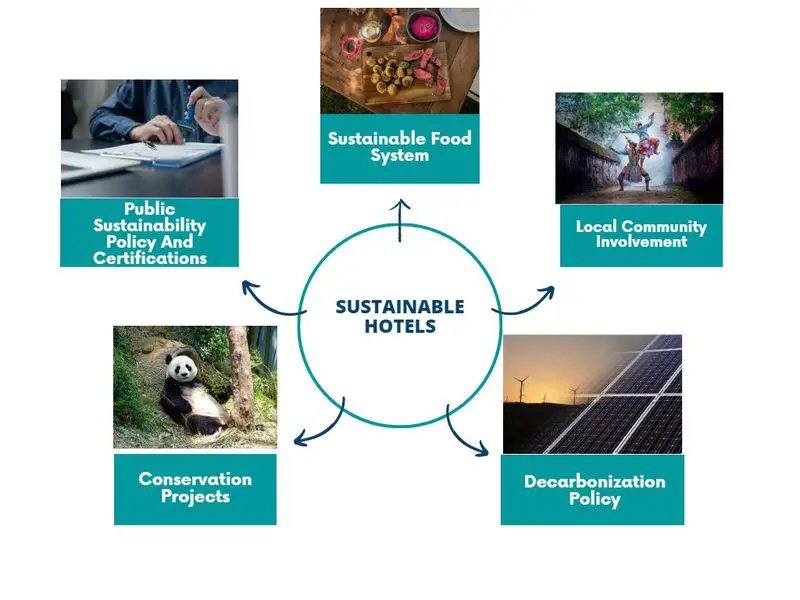As the tourism industry evolves, more travelers seek accommodations prioritizing sustainable and eco-friendly practices. Sustainable hotels are committed to reducing their environmental impact, supporting local communities, and promoting responsible tourism. But how can travelers differentiate genuine green hotels from those merely “greenwashing” their image?
Several factors define a sustainable hotel, and navigating the jungle of aspects that help us choose the best hospitality offer for our sustainable trips is challenging. Suppose we want better understand how to evaluate hotels’ commitment to eco-friendly and responsible operations. In that case, it is crucial to understand key indicators and identify certifications assessing the sustainability status of hotels. At the same time, tourists can look directly at hotel offers and activities to establish how sustainable hotel practices are.

What Are the Hotel’s Key Sustainability indicators?

- Energy consumption: This is the adoption of energy-efficient technologies, appliances, and equipment, as well as optimizing building design and insulation. But also integrating renewable energy and encouraging responsible energy use among staff and guests are other ways to manage energy.
- Water consumption: Water consumption is another important indicator of the hotel’s sustainability. It can be achieved by implementing water-efficient technologies, routine inspection, and maintenance of plumbing systems. Capturing and storing rainwater for non-potable uses and installing greywater recycling systems to treat and reuse water from sinks, showers, and laundry facilities for non-potable purposes are other practices that help hotels with water management.
- Waste generation: The principles of sustainable waste management practices for hotels revolve around the three R’s: Reduce, Reuse, and Recycle. Reduce waste by optimizing hotel operations, reducing packaging, and limiting the use of disposable items in guest rooms and common areas. Reuse products and materials whenever possible, such as refillable containers for toiletries, cleaning products, or repurposing furniture and equipment. Implement recycling programs for various waste streams, including paper, plastic, glass, and metals, and ensure proper waste segregation by staff and guests. Encourage the composting of organic waste, such as food scraps and yard waste, to reduce landfill waste.
- Greenhouse gas emissions: This indicator focus on minimizing the environmental impact of hotel operations and demonstrating a commitment to mitigating climate change. Hotels can proactively reduce their carbon footprint by implementing energy-efficient technologies and transitioning to renewable energy sources to minimize reliance on fossil fuels. They can also encourage low-emission transportation options for guests and staff, invest in credible carbon offset projects, and source products and materials with lower carbon footprints.
- Sustainable product sourcing: Emphasize the importance of responsible procurement in supporting local economies and promoting ethical business practices. Prioritize purchasing products and services from local suppliers with an eye on fair trade and ethical sourcing, choosing suppliers that adhere to fair trade principles and uphold ethical labor practices, ensuring fair wages and safe working conditions for their employees. Furthermore, they should source food products that are organic, sustainably produced, and, where possible, seasonal.
- Biodiversity conservation: Awareness of the importance of protecting and enhancing local ecosystems and promoting native flora and fauna are among the newest, significant trends hotels must integrate into their operations. Hotels can implement measures to protect native wildlife directly, such as creating suitable habitats, minimizing light pollution that may disrupt nocturnal species, and using native and regionally appropriate plants. But the more manageable way to help with biodiversity consertion is to support local habitat restoration projects, such as reforestation, wetland restoration, or invasive species removal, and proactively promote ecotourism.
- Local community engagement: This indicator emphasizes the importance of building solid and positive relationships with local communities, supporting their economic and social well-being, and promoting cultural exchange. It can be achieved through financial support, prioritizing local partnerships, and cultural support, facilitating interaction between hotel guests and the local community.
- Employee well-being: One of the most underestimated factors in the hospitality industry worldwide is the well-being of employees. Fostering a positive, healthy, and inclusive work environment, supporting employees’ personal and professional growth, and promoting a culture of respect and teamwork is the cornerstone of a winning sustainability strategy. Fair compensation, safe and healthy work environment, work-life balance, professional development, inclusivity, and support are the generally recognized requirements to increase employee engagement and well-being.
- Accessibility: An inclusive and welcoming environment for all guests, regardless of their physical, sensory, or cognitive abilities, is a must for hotels and an essential aspect of social sustainability. The hotel’s design should be straightforward and help with navigation; common areas, such as lobbies, restaurants, bars, and meeting spaces, should be accessible. Ensuring that spaces are accessible, functional, and usable; guest rooms and suites are fitted with wider doorways, roll-in showers, grab bars, and visual alarms are only a few examples. Equip hotel facilities with assistive technologies and providing or facilitating accessible transportation options are other helpful implementations.
Policies and Certifications for Sustainable Hotels
Several companies help assess and certify the sustainability of hotels.
Some are:
- LEED (Leadership in Energy and Environmental Design): A globally recognized green building certification system that provides a framework for sustainable design, construction, and operation of buildings, including hotels.
- BREEAM (Building Research Establishment Environmental Assessment Method): Another internationally recognized green building certification that assesses and rates buildings’ environmental performance, including hotels.
- Green Key: A leading standard for excellence in environmental responsibility and sustainable operation within the tourism industry, awarded to hotels that demonstrate a high commitment to sustainability.
- Green Globe Certification: A global certification for sustainable tourism that provides a comprehensive framework for hotels to improve their environmental, social, and economic performance.
- EarthCheck Certification: A leading environmental management and certification program for the travel and tourism industry, offering various services to help hotels measure, monitor, and improve their sustainability performance.
- Green Seal Certification: A U.S.-based certification that promotes using environmentally responsible products and services, including sustainable cleaning products and best hotel practices.
- EU Ecolabel: This Official European certification identifies environmentally friendly products and services, including those used by hotels, such as cleaning products and textiles.
- SA8000 (Social Accountability International): A certification focusing on responsible and fair employment practices, ensuring that businesses adhere to ethical labor standards and provide employees with a safe, healthy work environment.
- Fair Trade Tourism Certification: A certification that promotes responsible tourism, ensuring fair wages and working conditions, fair distribution of benefits, ethical business practices, and respect for human rights, culture, and the environment.
- Marine Stewardship Council (MSC) Certification: This organization recognizes hotels that source sustainable seafood, supporting the long-term health of fish stocks and marine ecosystems.
Each certification has its criteria and requirements, which hotels must meet to achieve and maintain the certification.
What Can You Look Up For

- Public Sustainability Policy: Check the hotel’s website or contact customer service to inquire about its sustainability policy. Reputable hotels should have this information readily available and transparent.
- Certification for Sustainability: Look for certificates on the hotel’s website, marketing materials, or physical premises. You can also verify the certification on the certifying organization’s website.
- Local Produce and Sustainable Food System: Check the hotel’s website or ask staff members about their food-sourcing policies. Sustainable hotels usually promote their use of local and eco-friendly food options.
- Local Community Involvement: Research the hotel’s community engagement on its website or social media channels. Look for evidence of collaboration with local organizations, support for local businesses, and promotion of cultural experiences for guests.
- Paperless Operations: Inquire about the hotel’s paperless initiatives, such as digital check-ins, online billing, and e-menus. This information may be available on the hotel’s website.
- Decarbonization Policy: Investigate the hotel’s efforts to reduce carbon footprint, and if a policy exists will often be on the website. Look for information on renewable energy usage, energy efficiency measures, and carbon offset programs.
- Conservation Projects and Guest Involvement: Explore the hotel’s website or social media channels for evidence of conservation projects they support or initiate. Check if they offer guests opportunities to participate in these projects or related educational programs.
- Active Communication of Policies and Activities: Assess whether the hotel actively communicates its sustainable practices on its website, through in-room materials, or staff training. Engaged hotels will typically be proactive in informing guests about their eco-friendly initiatives.
Conclusions
Identifying genuinely sustainable hotels requires a discerning eye and a clear understanding of the key indicators that reflect their commitment to eco-friendly and responsible practices. By examining sustainability policies, certifications, local community involvement, resource management, and guest engagement, travelers can make informed decisions when selecting accommodation options.
As a conscious traveler, your choices can encourage positive change within the hospitality sector. The growing demand for sustainable hotels drives the industry to adopt greener practices and policies, making travel more environmentally friendly and socially responsible. Ultimately, when travelers and hotels work together to prioritize sustainability, the entire tourism industry can move towards a more sustainable and accountable future.



